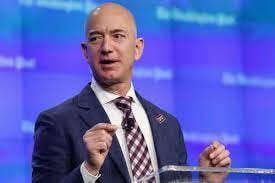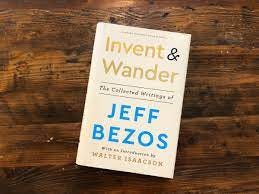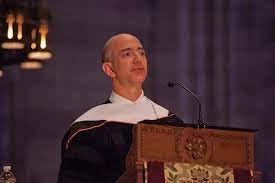How will you use your gifts? What choices will you make?
-Jeff Bezos, Princeton 2010
Jeff Bezos spent his childhood summers with his grandparents.
His grandfather, a former lieutenant commander in the US Navy, military researcher, and member of the US Atomic Energy Commission, is someone Bezos credits for giving him his entrepreneurial spirit. Together, on his grandfather’s ranch, they, “repaired windmills and castrated bulls; they attempted to grade dirt roads and built contraptions,” wrote Brad Stone in the Everything Store.
One day, he was driving with his grandparents. His grandmother was smoking, which he hated. So, he decided to tell her about it.
I’d been hearing an ad campaign about smoking. I can’t remember the details, but basically the ad said that every puff of a cigarette takes some number of minutes off your life: I think it might have been two minutes per puff.
I estimated the number of cigarettes per day, the number of puffs per cigarette, and so on. When I was satisfied that I’d come up with a reasonable number, I poked my head into the front of the car, tapped my grandmother on the shoulder, and proudly proclaimed, “At two minutes per puff, you’ve taken nine years off your life!
Bezos was very proud of himself.
He expected praise for his cleverness, and his grandmother to relent. But that’s not what happened.
Instead, she broke down crying.
After a few minutes, his grandfather pulled the car over, told Jeff to get out, and met him. There, he taught him a lesson Bezos never forgot.
My grandfather looked at me, and after a bit of silence, he gently and calmly said, “Jeff, one day you’ll understand that it’s harder to be kind than clever.
Bezos told this story to the Princeton graduating class of 2010, a speech captured in the book Invent and Wander, a collection of Bezos’ writings, made by Walter Issacson.
And the lesson that Bezos took away from it, the one I feel is maybe the best 10 ideas I’ve ever heard, is also the basis of today’s OGT.
Gifts Versus Choices
“What I want to talk to you about today,” Bezos said to a packed crowd, “is the difference between gifts and choices.”
He continued:
Cleverness is a gift; kindness is a choice. Gifts are easy—they’re given, after all. Choices can be hard. You can seduce yourself with your gifts if you’re not careful, and if you do, it’ll probably be to the detriment of your choices.
How will you use these gifts? And will you take pride in your gifts or pride in your choices?
The lesson he learned from his grandparents some 35 years earlier.
To further illustrate the power of a hard choice, Bezos told the story of Amazon’s founding.
I got the idea to start Amazon sixteen years ago. I came across the fact that web usage was growing at 2,300 percent per year. I’d never seen or heard of anything that grew that fast, and the idea of building an online bookstore with millions of titles—something that simply couldn’t exist in the physical world—was very exciting to me.
The thing is— Bezos was already 30, married, and had a hard-to-get, high-paying job in finance. When he told his boss that he was thinking about leaving, his boss said something that made him pause:
“That sounds like a really good idea,” his boss said, “but it would be an even better idea for someone who didn’t already have a good job.”
Jeff thought about it. He asked his wife— and she told him to go for it. She wanted him to chase his passion; to be an inventor.
It really was a difficult choice, but ultimately I decided I had to give it a shot. I didn’t think I’d regret trying and failing. And I suspected I would always be haunted by a decision to not try at all.
After much consideration, I took the less safe path to follow my passion, and I’m proud of that choice.
With that, he leaves the Princeton class—and the rest of us— with a hard series of questions.
How will you use your gifts? What choices will you make?
Will inertia be your guide, or will you follow your passions? Will you follow dogma, or will you be original? Will you choose a life of ease, or a life of service and adventure? Will you wilt under criticism, or will you follow your convictions? Will you bluff it out when you’re wrong, or will you apologize? Will you guard your heart against rejection, or will you act when you fall in love? Will you play it safe, or will you be a little bit swashbuckling? When it’s tough, will you give up, or will you be relentless? Will you be a cynic, or will you be a builder?
Will you be clever at the expense of others, or will you be kind?
He ends the speech on a hopeful, yet challenging note:
When you are eighty years old, and in a quiet moment of reflection narrating for only yourself the most personal version of your life story, the telling that will be most compact and meaningful will be the series of choices you have made. In the end, we are our choices.
The OGT
The speech is inspiring and daunting.
On the one hand— we can choose who we want to be. That’s empowering. As you read through Bezos’ questions, you can tell which side you want to be on. And it’s up to you. A hopeful note.
On the other hand, a lot weighs in the balance, including our own long-term wellbeing. It’s not just that we have the ability to choose, but that we have the obligation. And these choices are hard to make consistently over time.
So, how will you use your gifts? How will I? What choices will we make?
Hopefully, more times than not, we choose to be kind.





